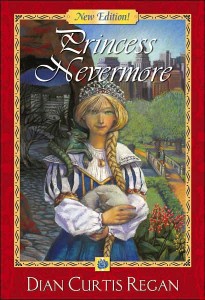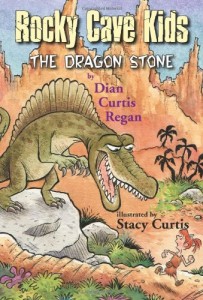Dian Curtis Regan is an American author of over 50 books for young readers. She was born in Colorado Springs, and, after living in Oklahoma, Texas, Kansas, and Venezuela, has recently moved home to Colorado. In this interview she talks about her books, her love for fantasy, reading and writing.
Voicu Mihnea Simandan: You have been a story writer for most of your life. How has your writing evolved over time?
Dian Curtis Regan: I started out making all the mistakes beginning writers make. But I read the type of books I wanted to write, took classes, studied the market, and continued to write until I began to publish. My particular style of writing evolved through the first three novels. I feel that I found “my voice” as a writer with my fourth novel. (Jilly’s Ghost)
VMS: Where did the ideas for Princess Nevermore (2007) and its sequel Cam’s Quest (2007) come from?
DCR: A few years out of high school, I read the Chronicles of Narnia (C. S. Lewis) and the Chronicles of Prydain (Lloyd Alexander). I loved those books and wanted to create my own fantasy world–which became Mandria. Princess Nevermore started out as a picture book, but the story was so much more than that, and grew into a young adult novel.
Countless readers wrote to ask “what happened next.” I had always planned to write a sequel, so the idea for Cam’s Quest was always waiting in the wings.
VMS: Why are you so fascinated with fairy tales and fantasy?
DCR: I think many writers are drawn to write the type of stories they read while growing up. I’ve always loved fantasy. I’ve written in every genre, but I enjoy the process more when fantasy is involved.
Many of my books are contemporary stories in which I’ve dropped a fantasy situation: The Monster of the Month Club books, and older titles like My Zombie Valentine and The Vampire who came for Christmas, to name a few.
 VMS: Illustrations are a very important factor in any children’s books. Monster Baby (2009) was beautifully illustrated by Doug Cushman. What was your working relationship with the illustrator?
VMS: Illustrations are a very important factor in any children’s books. Monster Baby (2009) was beautifully illustrated by Doug Cushman. What was your working relationship with the illustrator?
DCR: Normally writers and illustrators do not work together. Authors work with an editor and illustrators work with art directors. But in this case, Doug is a friend, so we consulted on the side as well. Doug also illustrated my newest book, The Snow Blew Inn (Holiday House, 2011).
VMS: Tell us about your Rocky Cave Kids series and The Dragon Stone (illustrated by Stacy Curtis, 2011) the first book in the series.
DCR: Rocky Cave Kids also began as a picture book. The story grew into a chapter book with fun illustrations by Stacy Curtis. Imagining what life might have been like for kids 250 million years ago was a lot of fun.
VMS: You’ve also branched out from children’s books and have written some well-received chapter books, Middle Grade books and Young Adult novels. Do you employ similar skills when writing books targeted for an older readership?
DCR: For me, the shorter the book, the harder it is to write. Every word in a picture book has weight. When writing for older readers, an author doesn’t have to be concerned with either word count or vocabulary, which is freeing. But no matter the length, all stories must have strong and interesting characters, caught in a moment of life that is challenging, dangerous, and exciting.
VMS: Everyone seems to believe that children no longer read and, with the availability of affordable e-readers, many believe that, sooner or later, children will no longer want to hold books in their hands. Please comment.
DCR: I think e-readers are terrific. However, I do not think they will cause the demise of bound books. I think both can co-exist.
VMS: You are very active online and maintain an excellent website. How important is it for writers these days to be “out there” on the Internet, interacting with their fans?
DCR: I think part of the “business” of being a writer is to make information about yourself and your books easily accessible online. Students google authors in order to write book reports. Make it easy for them. When I am looking for information about a writer, I appreciate easy-to-negotiate websites without a lot of bells and whistles.
And, of course, Facebook and Twitter make it easy for anyone to visit with a favorite author.
VMS: You’ve recently been on quite a few school visits. What were some of the highlights of these visits?
DCR: School visits are a terrific way to connect with a young audience and get feedback about your books. I think the most important thing an author can leave behind is enthusiasm for books and storytelling, both of which create life-long readers.
 VMS: Do you still read children’s books and young adult fiction?
VMS: Do you still read children’s books and young adult fiction?
DCR: It’s pretty much all I read. This is such a golden time in children’s literature with such good work being done. I read in my field not only to keep up, but because it’s so enjoyable.
VMS: What book are you working on right now?
DCR: I am turning a picture book about “SpaceBoy” into an easy reader series for a publisher. I’m also working on a science fiction chapter book called StarKids. Lots of other ideas are waiting in the wings.
VMS: What is your writing routine?
DCR: I used to be a morning writer, but the last novel was written between the hours of 9 pm and midnight. I’m good at writing in bits and pieces of time. When you’re on deadline, you learn how to go into “work mode” whenever you have a block of time to focus.
Right now, I’m adjusting to a new life in a new state with a future husband who works from home, so I suspect my writing routine will change. It’s a good thing I’m adaptable. :>
VMS: What advice would you give to aspiring writers?
DCR: There is nothing easy about any aspect of this business—the writing, the market research, the search for an agent and a publisher.
I am in several writing groups. Members include National Book Award nominees, an Edgar winner, Newbery winner and honoree, and a list of other honors. And what do we talk about? How hard it is. How dedicated one has to be.
I know it’s easy to get discouraged, but early on, I heard an editor say, “If your writing is good, you WILL get noticed.” So my advice is to focus on that: make your writing unique and as good as it can be. If you are committed to quality, the rest will come. Have faith.
VMS: Thank you for your time.
DCR: Thank you! All best to you and your students.
Listen to an interview with Dian:
Voicu Mihnea Simandan
Bangkok, Thailand
October 27, 2011


Thanks for posting this article. Very interesting. I also learned that you moved back to Colorado Springs. Lucky you.